#it sold around 25000 only in the summer it was released!!!
Text
Motorola startac 70 my beloved <333
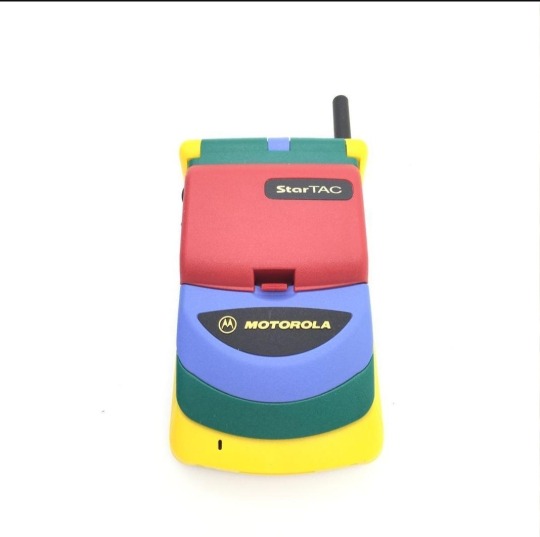
#fun facts! the whole idea stemmed from the volkswagon limited run harlequin car released the same year#it was also produced from scrap plastics so each coloured piece is a different plastic. making it one of the hardest to produce#motorolas European branch asked their hq (in Chicago?? i think. or arizona idr) for permission to make the phone and were told no. so the#it anyway right here in scotland!!!#because of the difference in plasic characteristics only one colour scheme was ever offered#it sold around 25000 only in the summer it was released!!!#its also known as the startac rainbow for obvious reasons#the casing can also house '85 components!!!#all around a rlly cool and interesting older phone :DD#psii.txt
8 notes
·
View notes
Text
Early 1920s Non-English American Records by OKeh
I’ve only begun researching the history of the early recorded music industry. From the beginning, I’ve been interested learning about certain series of records sold by OKeh, a company (of course not the only one) which sought out musicians from a variety of cultural and ethnic groups to appeal to North American and American immigrant demographics. OKeh was one of the first companies to regularly conduct field trips locating musicians in areas that previously lacked recording studio access.
OKeh is responsible for tapping into multiple demographics that had been underrepresented or absent from early commercial music records. In 1920 OKeh recorded Mamie Smith’s “Crazy Blues,” in which Mamie Smith was the first African-American female singer to lead a commercial recording. It was “unexpectedly” successful and broke open the doors for major recording companies to produce materials specifically for African-American audiences. This song alone is worth a ton of research, discussion, and analysis regarding its social background and its bold, hard-hitting lyrics like, “Get myself a gun and shoot myself a cop.”
The same individual who supervised Mamie Smith’s recording, Ralph Peer, is also credited with bringing us the first successful country music record, that of Fiddlin’ John Carson in 1923. It was almost the first country music record, too, but A. C. (“Eck”) Robertson recorded in the summer of 1922 for Victor and saw his music released in April of 1923; John Carson was recorded on June 13, 1923, and his music released August 3, 1923. Even though Peer considered either Carson’s singing or the recording quality “pluperfect awful” (different accounts say different things), this record sold like hotcakes.
To be clear: the motivations behind OKeh and Ralph Peer were that of profit, not representation. And Fiddlin’ John Carson, despite being an integral part of country music history, is no personality to celebrate. But it is nevertheless a unique and informative area of music history to explore for both the good and bad residing in it.
I’ve known the stories of Mamie Smith, Ralph Peer, and John Carson for some time, but I haven’t delved as much into OKeh’s early 1920s music in which they recorded many other cultural groups in North America. Today, I’m peeping into their early catalogue, which is excitingly available online, and contains occasional digital files of the old records.
From 1918-1934, OKeh designated entire catalog series numbers to music and comedy from many people groups and languages. These were, as designated by OKeh itself: Race [that is, African-American] (8000 and 20000), Italian (9000, 84000, and 86000), German (10000, 81000, and 85000), Polish (11000, 67000, and 87000), Hungarian (12000 and 86500), Roumanian (13000 and 83500), Finnish (13500), Jewish (14000), Porto Rican (14000), Russian (15000), Ukranian (16000 and 81500), Mexican (16000, 16400, and 88000), Bohemian (17000), Slovak (18000), Scandinavian/Swedish (19000), Danish (20000), Irish (21000), French (22000), Serbo-Croatian (23000), Slovenian-Krainer (24000), Croatian (25000), Norwegian (25000), Lithuanian (26000), Swiss (27000), Welsh (27500), Greek (28000), Portuguese (29000), Chinese (29000), Spanish (33000), West Indian (65000), Bulgarian (69000), Armenian (77000 and 78000), Hebrew (80000), Portuguese (80500), Greek (82000 and 82500), Turkish (83000), and Bohemian (89000). Think I got all that right.
I’m not here today to seek out the most famous songs that have come out of OKeh’s early 1920s, but I am here to have fun, and I hope it’s fun to share with you songs in different languages I’ve found, looked up, and listened to. Because what’s cooler than what American immigrant and minority populations listened to 100 years ago?
Do note: lots of the audio files are quiet, so you’ll need to crank up. Also note: since this was a hundred years ago, sometimes the record label’s language choices can get... wonky... from a modern perspective. I don’t think here anything’s weird, but I want to give warning because I’ve Seen Things before.
S-70969 OKeh 14054 Mein Griner Cosin / Ich Bin A Border Bei Mein Weib
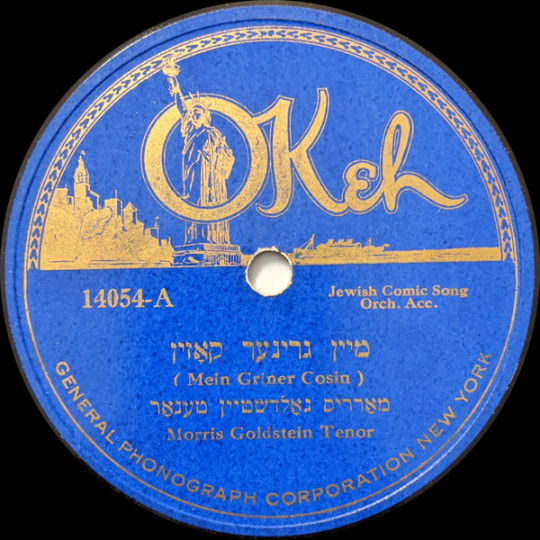
Tenor Morris Goldstein, singing in Yiddish and backed by an orchestra, was recorded November 1922 in New York, New York. As you can see on the label above, OKeh has it labeled as a “Jewish Comic Song.” Both Morris Goldstein and the composer of this song, Morris Rund, have their names appear on many other records. In fact, looking at Morris Goldenstein, he appears on a large number of records from five companies (Victor, Columbia, OKeh, Brunswick, and Edison) between 1916 and 1929. I desperately wish I could find more information about him, especially given how well-recorded he was, and at such an early time, indicating some level of prominent singer, but regrettably the internet is turning me up dry. I will say, even with this audio being nearly 99 years old, his voice sings out wonderfully.
I actually just stumbled across a copy of this record on eBay, which is fun to see floating around. And reliable discogs has this listed, too, albeit to no surprise, there’s no copies for sale.
8440 OKeh 26024 Pamylējau Vakar / Vai, Varge, Varge
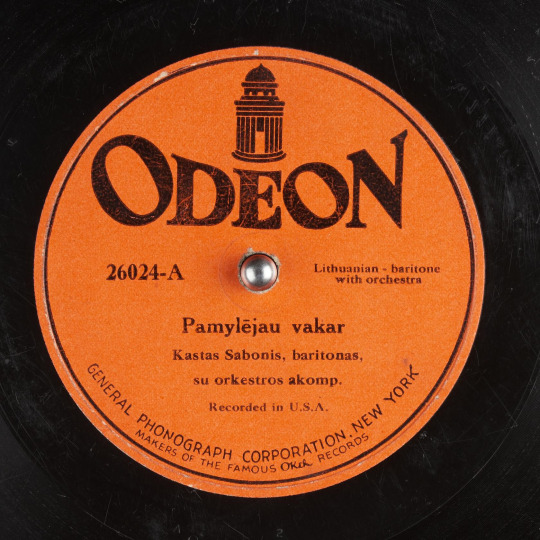
Lithuanian! I found a hundred songs in the OKeh matrices in this language. This recording by baritone singer Kastas Sabonis was recorded in Chicago, Illinois, in July of 1923. Unfortunately, I have less on Sabonis than I do Goldstein, but I noticed Sabonis reappears on Columbia in 1925 and Victor in 1926.
One of the things I am fascinated by is how the main label material (song title, performer) is in Lithuanian, but the rest is in English. In some ways, you could say this makes sense... non-Lithuanian consumers can understand the gist of what it’s about, and Lithuanian people can potentially recognize the title of a song they’re already familiar with. And like, it’s always better to keep the title of the song in its actual language.
Also ironically, one of these records was sold online in late January 2021. So these do float around, still.
S-7310 OKeh 4801 Kuu Pua Loke / Mauna Kea O' Hawaii
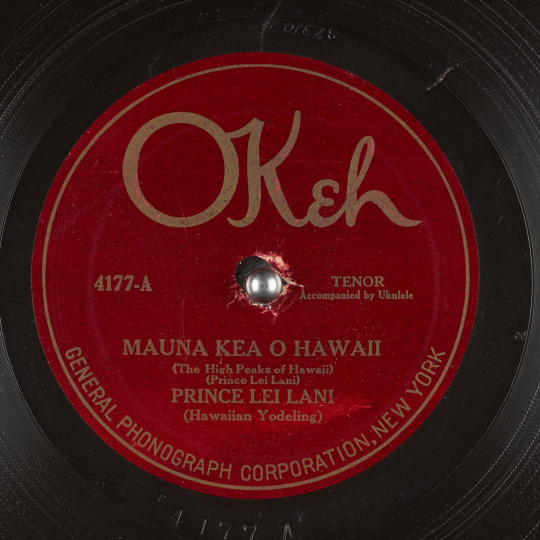
We have records of Prince Lei Lani between 1913 and 1928. He started with Victor and switched to OKeh in 1920. This song, Mauna kea o' Hawaii, is the second song he recorded with OKeh; he was recorded in New York, New York. It’s a beautiful recording.
He was born in 1887 in Hawai'i as Edwin Kaumualiiokamokuokalani Rose. Sometimes you’ll see his name as Prince Leilani, Edwin K. Rose, or E. K. Rose. He was in three movies: Waikiki Wedding (1937), Hawaiian Nights (1939), and Bird of Paradise (1951). Lest you forget how nascent the recording industry is, Prince Lei Lani died in 1971. I’ve found one blogger, a relative of his, who’s translated articles and advertisements from Hawaiian to English and collected information on him, in case you’re interested seeing photographs of him and learning more. There’s some fun stuff here.
73798 Odeon 18056 Prychod Z Krčmi Na Svite
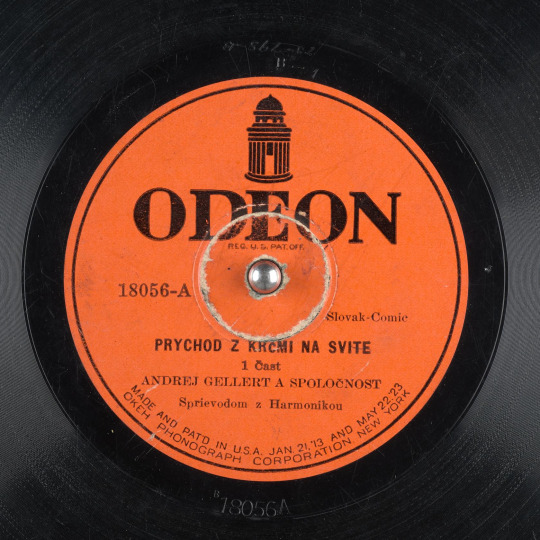
Comedy! Slovak comedy! Although the database tells me this is a “Male vocal solo, with accordion,” there’s clearly two singers, and the majority of the recording is speech. The singing duet backed by accordion seems to be, to my untrained ear, an opener and a closer to the act. Comedy recordings are a fun element of early records I need to get more into, and while I can’t understand Andrej Gellert’s speech, the fact he’s intentionally interspersing his speech with hiccups makes it clear to me this is a humorous sketch.
This was recorded November 1925 in New York, New York.
There are more digital files of Andrej Gellert on this site. These ones are music. That’s probably why he got listed as “Male vocal solo.” You can hear Mlynské kolo tosa toci, from the same recording session as Prychod z krčmi na svite. There’s also Lístie opadlo (this one’s really cool) and Na ćo som na svete?, and Veselý pastier recorded May 11, 1925. Frankly his list goes on forever. He did quite a lot for Victor and OKeh between 1923 and 1928.
And to again emphasize these things can be found: there’s a copy of one Andrej Gellert record for sale on discogs for $7.67 + shipping.
That’s about all the time I have today to screw around with early recordings. If I come back around again with more tidbits like this, don’t be surprised.
#thatbanjobusiness#that banjo business#old tags--#Americana Deep Dive#I need to fix my tags on this blog so bad I'm sorry#music#General Banjo Business#long post#Haddock Deep Dives#Country Music History#Collectors Corner#Playlist#sorta a bunch of things at once I s'pose
1 note
·
View note